How To Choose A Blog Name
Learn how to choose a blog name for your new blog with these unique blog naming formulas!
Struggling to find the perfect blog name that feels right and won’t box you in later? You’re not alone, I’ve been there, and I’ve made the mistakes I now help others avoid.
When I started blogging several years ago, I picked my first blog name on a whim. It sounded cute at the time, but within a few months, I realized it didn’t reflect what I truly wanted to share. My blog grew, my interests evolved, and suddenly the name I had once loved felt limiting. I ended up starting over again.
In this guide, I’ll walk you through everything you need to know to choose a blog name you won’t regret, including brainstorming tips, naming formulas, real-life examples, SEO considerations, and a free blog name worksheet you can download. Let’s help you find a name that truly fits now and in the future.
DISCLOSURE: This post may contain affiliate links to products or services I use and recommend. I may make a small commission on any purchases you make using these links, at no extra cost to you. Read my Disclaimer for more information.
Why Your Blog Name Matters More Than You Think
Here’s the truth: your blog name matters more than you think. It’s your first impression, your identity online, and the anchor for your branding, niche, and future growth. A well-chosen blog name can make you more memorable, easier to find in search results, help you stay flexible if your blog evolves, and it can shape how your blog is perceived, remembered, and discovered online.
A great blog name does three things:
- It tells readers what your blog is about – A relevant name gives immediate context, helping your audience know if your content is for them.
- It builds a recognizable brand – A memorable name sticks. It influences SEO. It makes your blog easier to share, recommend, and grow over time.
- It supports future growth – The right name gives you flexibility. If your content shifts slightly, your name should still make sense.
Choosing the wrong blog name can limit you. It can confuse readers, reduce search visibility, and even force a rebrand later. That’s why it’s worth taking time to pick a name that aligns with your niche, your voice, and your long-term goals.
If you’re asking, “Does my blog name really matter?” the answer is yes. It affects your brand identity, search engine rankings, how people talk about your blog, and whether they remember to come back.
Your blog name is important because it tells readers about who you are, the topics you’re blogging about, if they’ll resonate with your message and more. So, what is your blog name going to be?
Now, this is the part that stumps a lot of new bloggers. I know this because I was there too.
So, how do you come up with a blog name that represents your brand and can be remembered later when people search for it on Google?
Pin this post to Pinterest: Would you mind sharing on Pinterest so others can see it too? Thank you for sharing this post. It means a lot!!

5 Things To Consider When Choosing A Blog Name
1. Your WHY :
After reading the book ‘Start with Why’ by Simon Sinek, I have since agreed with and adopted his stance on the importance of defining your ‘why’ before starting any enterprise (your blog inclusive).
Begin by answering the questions:
- Why did you decide to blog?
- What purpose do you want to achieve with your blog?
- What is your blog’s mission?
- What are you trying to communicate to your readers?
- What part of that message is important or personal to you?
Choosing your blog name is easy once you have established your blog’s ‘why’ or mission.
So, if you can identify what your purpose for starting a blog in the first place is, you’ll have a good foundation for coming up with a smart blog name that relates back to your overall message and goals.
Keep in mind that not every blog needs to be deeply meaningful or serious in nature, either.
If you are finding it difficult to come up with something, the information in this post: Why You Should Start a blog might be helpful.
2. Your Niche :
What is your blog going to be about? What are you going to be talking about? What services do you intend to offer on your blog? What will be the central theme of your blog?
Knowing your blog’s niche (who you’re talking to and what you’re writing about) can help you know exactly what to name your blog. Whether you want to blog about parenting, productivity, personal finance, or pet life, naming your blog with your audience and niche in mind can make it easier to be found and remembered.
And I have a full guide on this topic: how to choose a profitable niche for your blog.
3. Your Audience :
Who are you writing for? Who will be reading your blog and using/paying for your services? What do they need? What problems do they have that you intend to help them with?
Your blog name should represent you and appeal to your audience.
If you’re not yet sure who your audience is or how to attract them, your next mission is to develop a picture of who your readers could be, then learn their needs and desires as time goes on.
To build this important relationship with your target audience, you’ll need to do more than just a little keyword research.
One way to connect with your audience is to find them in the real world (or online) in Facebook Groups, online communities (like Quora and Reddit) and in the comments sections of other more established blogs in your niche.
4. Your Writing Tone:
What is the tone of your blog going to be like? What tone do you enjoy writing in? Expert? 3rd party? formal? personal? fun? casual?
Is your tone light and fun, personal and vulnerable, or expert and instructional? A playful blog name won’t match a serious writing voice, and vice versa. Let your name hint at the blog experience you’re creating.
5. Do You Intend Branding Yourself or Building Your Brand Around Your Blog Name?
This goes back to your ‘why’, your purpose for starting a blog. If you intend to use your blog to build a personal brand and establish yourself as an expert/authority in your niche, then it is advisable to use your name as your blog name.
- If you choose a blog name that is completely unrelated or irrelevant to your content, it is not going to do you any favours. Your blog name determines how narrow or wide you go with your content.
- If you spend hours trying to choose a blog name and then decide later to blog about something entirely unrelated to the name, you’d have wasted your time. That’s like deciding on the name: “Posh fashion” and then trying to create content around kids’ craft or food recipes.
But deciding on a general, ‘non-specific’ name or using your own name, can give you the room to brand yourself and write about anything and everything.
6. Think Long-Term: Room to Grow
Avoid names that box you into one specific topic unless you’re 100% sure you’ll never pivot. For example, naming your blog “Keto Kitchen Queen” might limit you if you later want to blog about fitness or motherhood.
Will you need to change your blog name to match the change? Is it open-ended enough to accommodate a shift in purpose or a new direction? Or will you need to rebrand or start over?
One of the reasons I deleted my second blog (sweet addictions) was the blog name. I was growing, my blog was growing, and it got to the point where I felt I needed to change direction or introduce more topics to my blog. I wanted to start talking about personal growth and mindset, and help people with the things I had learned in my personal growth journey (rather than just talk about cakes, sweets and all the sugar addictions I had). But I couldn’t find a way to merge or fit this new direction into what had been before. So I took it down and started all over.
I don’t want you to make the same mistake. So think carefully about what you truly want to achieve with your blog and make allowance for growth and future changes.
7. Is it Easy to spell, say or remember?
Your blog name should be easy to spell, say, and remember. Avoid complicated spellings, numbers, or hyphens. Think of how it sounds when said out loud and how easy it would be to type into a search bar or URL.
The photo sharing site ‘Flickr’ had problems initially because people naturally typed ‘flicker.’ What they did was to buy off both domains and set up a permanent redirection, so they don’t lose business.
Now typing ‘flicker.com’ will automatically redirect you to ‘flickr.com.’
It is okay to be clever with words. But you also have to be careful. Choose a blog name that is easy to spell, pronounce and remember.
Take Action:
- Download the Blog Name Worksheet to help walk you through this process
- Make a list of blogs you regularly read and see how they fit the conditions I shared above.
Need help with your blog? We offer blog management (writing, publishing, maintenance, email newsletters, etc), SEO, blog post updates and Pinterest services to help you grow your blog and be as hands-off or hands-on as you want to. Check out our services and reach out. We will be happy to work with you!
How To Choose a Blog Name: Blog Naming Formulas That Work with Real Examples
If all of what I shared above was confusing for you (which I doubt it was), here are some very helpful formulas and (quick) ways to help you choose a blog name for your blog today.
1. Topic or Audience Focused Blog Naming Formula
- Blog name = [topic or audience] + [why or end goal]
- Blog name = [audience] + [transformation]
Example of blog names created with this formula:
1. WPBeginner:
Why it works:
One of the reasons WPBeginner is successful is that the name is simple, easy to remember, and people know exactly what to expect. There are lots of blogs teaching about blogging and tech. But this one is specifically dedicated to new bloggers and beginner WordPress users who find it difficult to use, set up or navigate WordPress. And with people creating new blogs every day on WordPress, this blog will always have readers landing on their pages for one WordPress problem or the other.
2. Pro Blogger
Why it works:
Same concept as wpbeginner and could also pass off as using prefixes. The name is not only memorable, it also clearly communicates the blog topic or audience and the end goal — ‘become a pro blogger’
There are many blogs that has been named using this formula. So, if you are feeling inspired already, you can just grab a paper and begin creating. Think of how you can merge your blog topic or audience with your blog’s why, and see what comes out of it.
Other Examples:
- iPhone Photography School = [iPhone owners] + [lessons on how to take better photos with your iPhone]
- Photography Life = [photographers (all levels)] + [guides on landscape, wildlife, and portrait photography]
- Mom Hacks Daily = [moms + practical daily tips]
- Fit After 40 = [fitness for over-40s]
2. Create a Portmanteau
A portmanteau is a word that blends the sounds and combines the meanings of two other.
For example:
- ‘podcast’ is a combination of the words iPod and broadcast
- ‘brunch’ comes from breakfast and lunch
You can combine two words to create a new word, especially two words that speak about what you’ll help your audience with, or key brand values.
A good example is Primility by Jerod Morris from Copyblogger. It combines ‘Pride’ and ‘Humility’:
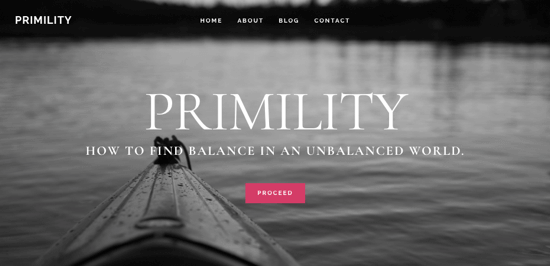
- Here’s a long list of portmanteaus for more inspiration.
WordUnscrambler.net has a useful tool for testing these types of words.
So, if you don’t feel like you have to be constrained to real words for your blog name, you can use words that say something about what/how you intend to help your audience with, your mission and values. Or you can combine or create a completely new (strange, unrecognizable) and unique word for your blog name.
Think about some of the most recognizable companies in the world today. Many of them have names that are truly nonsensical when taken out of context.
- Xerox
- Kodak
- Sony
- Häagen-Dazs
The name you come up with (like the examples above) may not really mean anything.
The natural downside of using a made-up word as your blog name is that it’s essentially meaningless (until you’ve made it big). People won’t automatically understand what your blog is all about.
The upside, though, is that you can make your blog name mean whatever you want it to mean. Using a made-up word or combining 2 words allows you to brand your blog any way you choose.
Use Namemesh to test the words you want to combine.
3. Use A Blog Name Generator
There are many blog name generators available online. I suggest you try these:
Type in your keywords, and Namemesh will return multiple variations of your keywords with available extensions. A pop-up on the Namemesh site will give you the availability of the domain name on Facebook and Twitter. Free.
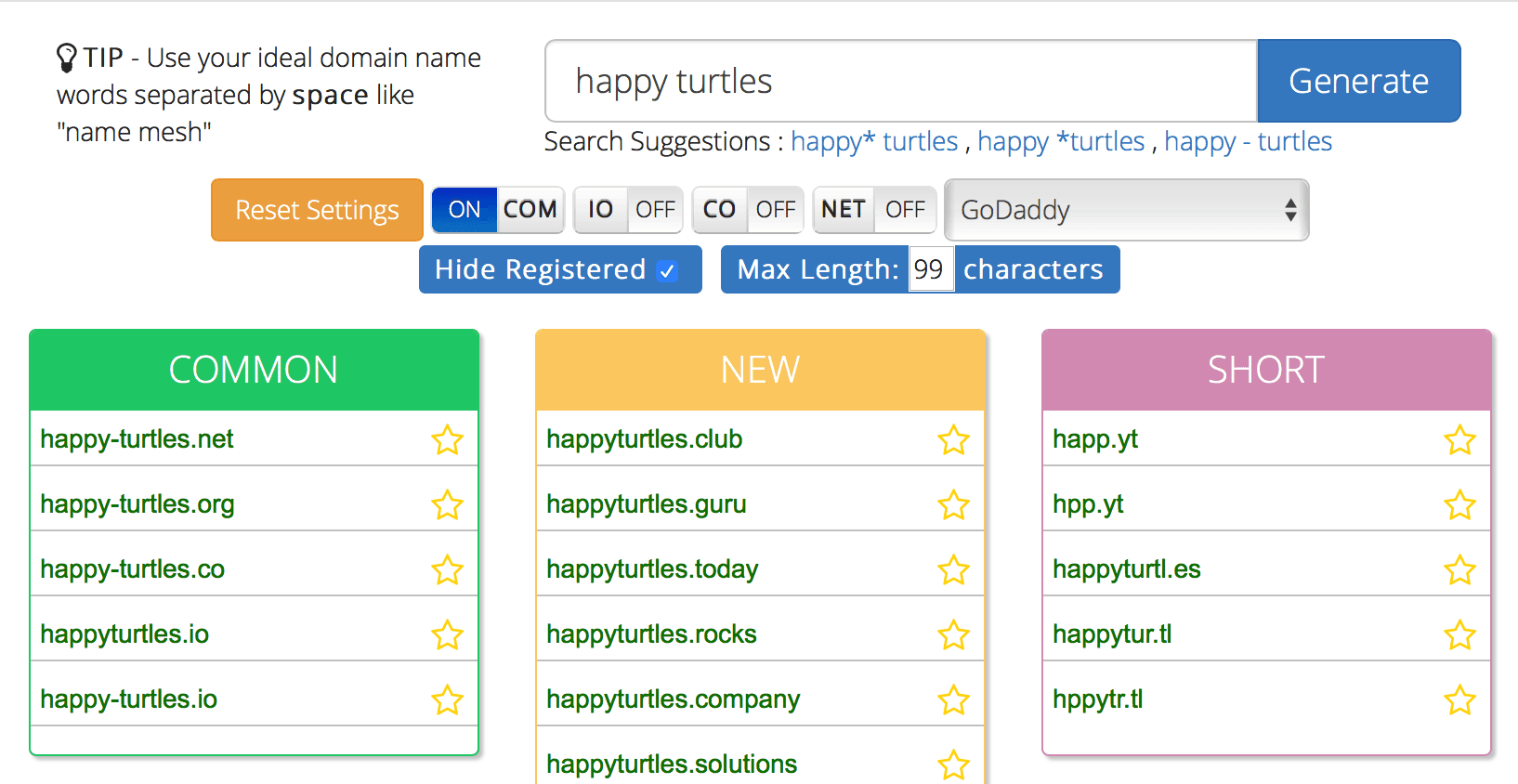
Panabee is a simple way to search for company names, domain names, and app names.
Type your keywords into the search bar. By default, only .com extensions are returned.

You enter a couple of words, e.g. ‘camera tricks’, and Panabee generates lots of suggestions derived from phonemes, syllables, abbreviations, suffixes, prefixes, and popular domain trends:
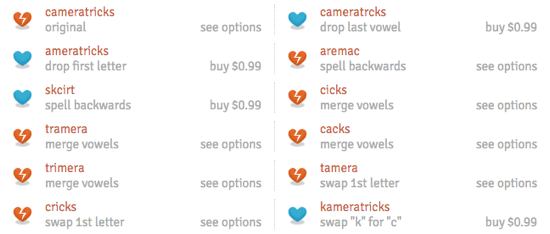
There’s also a list of related terms for each word, plus availability checks on domains, app name, and social media profiles.
LeanDomainSearch will combine your keywords with other common prefixes, suffixes and words shown in bold type, such as “MyBlogPlus”, whereas Namemesh and Panabee add any combination of phonemes, syllables, abbreviations and deviations which create make up words such as “myblogeo”.
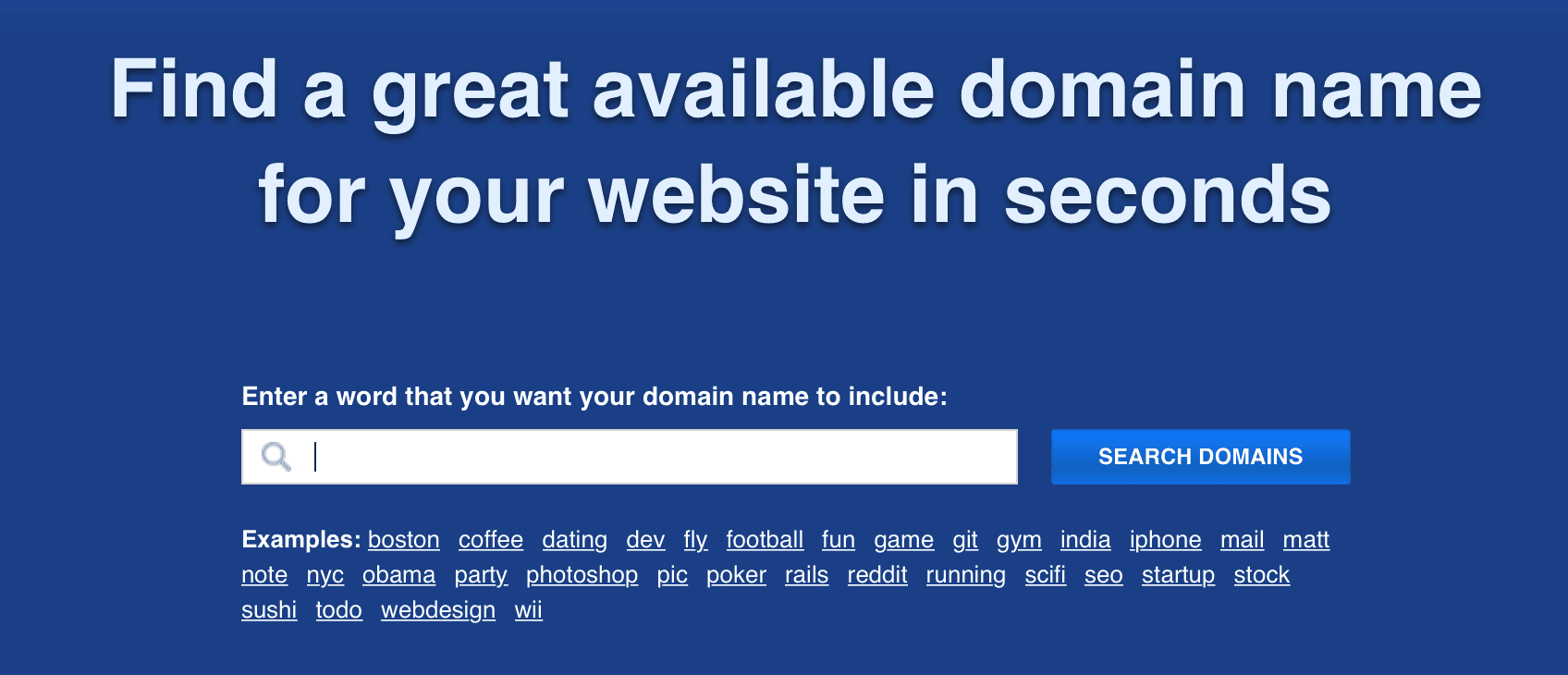
Wordoid is a great tool for finding creative, catchy names with made up words. Type in a word and click on “Create wordoids”.
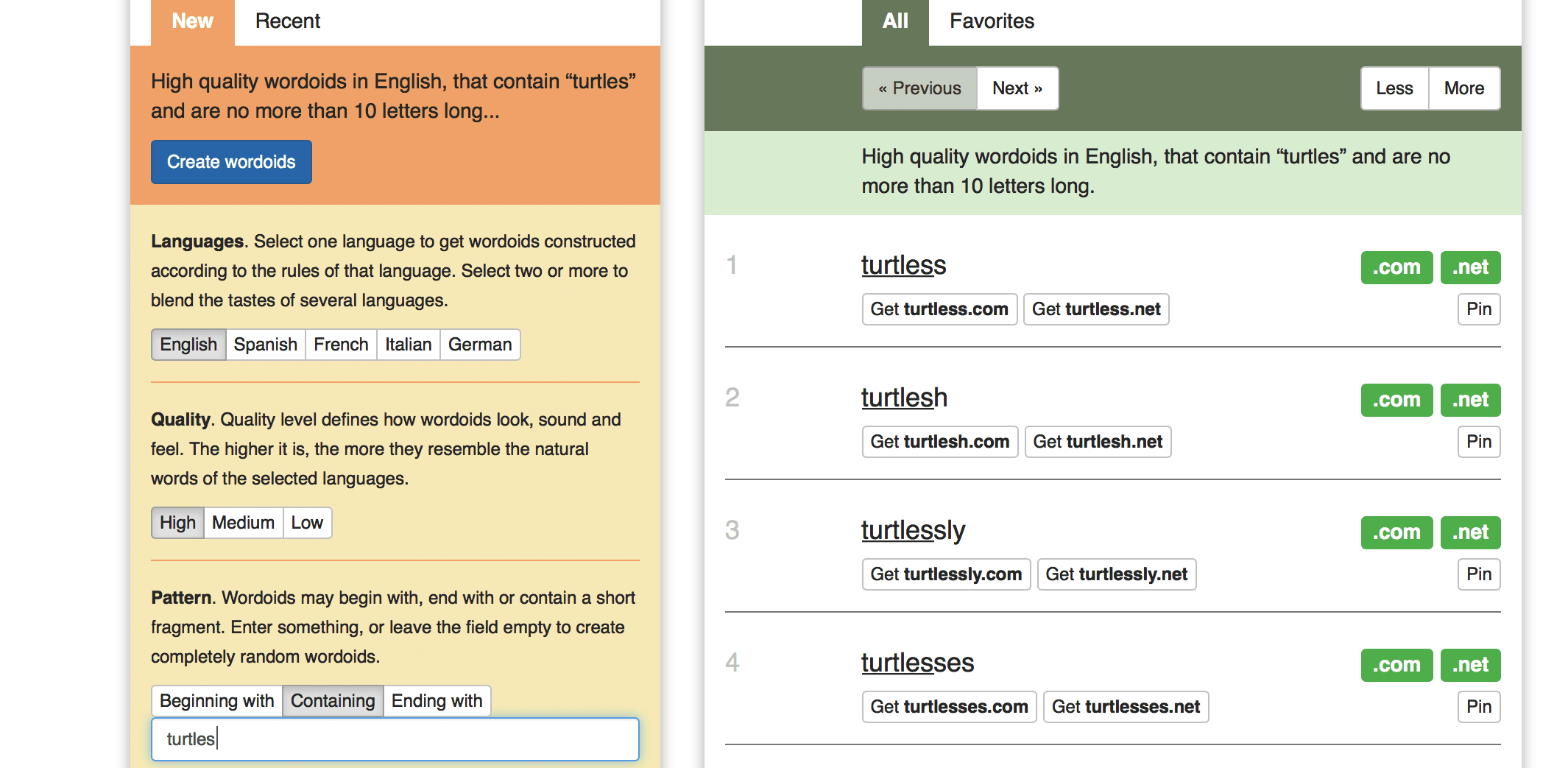
- Social Media
Check your favourite name on knowem.com for availability on over 500 popular social networks, before you purchase.

4. Get Inspiration From Books and Book Titles
Did you know that reading can open your mind and improve your imagination in fascinating ways?
With millions of books out there, all filled with wonderful words, why not use one of your favourite books to choose a blog name?
Your perfect blog name may just be hiding away inside your favourite book. It might be a word or a phrase that catches your attention a few pages in or resonates with your blog’s ‘why’.
Or more often than not, the simple act of reading something you’re interested in might just open your mind to thinking outside the box for a bit.
5. Grab a Dictionary
A Thesaurus can be a goldmine of inspiration.
Pick a keyword or keywords from your niche or topic, and look up their synonyms. This might help you choose a blog name that says a ‘common’ thing in a slightly different way.
6. Try Alliteration
We use alliteration in our day-to-day life, most times without even realizing it.
Blog Naming Mistakes to Avoid
Before you commit to a blog name, make sure you’re not setting yourself up for confusion or future regret. These are some of the most common (and costly) blog naming mistakes new bloggers make:
1. Overly Clever or Niche-Limiting Name
A name that’s overcomplicated or too witty might confuse readers who don’t get the reference. Likewise, names that lock you into a narrow niche, like “Cupcake Queen” or “Budget Bride 2024”, (especially if you’re not sure of how your plans might change in the future) can limit your content and growth potential later on.
Fix: Choose clarity over cleverness, and leave room for your blog to evolve.
2. Trendy Jargon or Slang
Using buzzwords or phrases that are hot right now can make your blog feel outdated in a few years. Words like “vibes,” “lit,” “slay,” “bossbabe”, or “bae” might work today, but not forever.
Fix: Stick with timeless, relevant, and easy-to-understand language across different age groups.
3. Confusing Spellings or Made-Up Words
Using intentional misspellings or strange mashups (like “KuteKrazyKrafts”) might look fun, but they’re hard to type, pronounce, or remember, especially for first-time visitors.
Fix: Choose names that are phonetically clear and easy to spell without having to explain them.
4. Names Too Close to Other Blogs or Trademarks
Using a name that resembles a popular blog, brand, or product can confuse readers and, even worse, get you into legal trouble.
Fix: Always do a quick trademark search and Google the name to check for lookalikes. If it sounds or looks too similar, it’s best to find something original.
FAQs: Questions About Naming Your Blog Answered
What makes a good blog name?
A good blog name is memorable, easy to spell, relevant to your niche, and flexible enough to grow with your content.
Should my blog name include keywords?
Including keywords can help with SEO, but it’s unnecessary. Focus on clarity and brand potential over stuffing keywords.
Can I change my blog name later?
Yes, but changing your blog name later can affect your branding, SEO, and backlinks. It’s best to choose carefully from the start.
Is it better to use my own name or a brand name?
Use your own name if you’re building a personal brand. Choose a brand name if you want to grow a niche-focused blog or build a business around it.
How long should a blog name be?
Ideally, 2–4 words. Keep it short, simple, and easy to remember.
Can my blog name be made-up or unique?
Yes, unique or invented names can work well, as long as they’re easy to pronounce, spell, and brand.
What if my blog name is taken?
If your ideal blog name is already taken as a domain or social handle, try slight variations. Add a word like “blog,” “journal,” or “by [your name],” or use a different extension like .co or .net. Just make sure it’s not too similar to a trademarked brand.
Is .com necessary for SEO?
No, a .com domain is not strictly necessary for SEO, but it is still the most trusted and recognized extension globally, especially for English-speaking and international audiences. Search engines treat all domain extensions equally in terms of ranking potential. A .co, .net, or niche-specific domain (like .blog or .studio) can rank just as well as a .com as long as the content is high-quality, relevant, and optimized.
Conclusion: Your Blog Name Sets the Tone for Everything
Choosing the right blog name isn’t just a creative decision; it’s a foundational one. It affects how your audience finds you, remembers you, and connects with your content. Whether you want to build a personal brand, create a niche authority site, or grow a multi-topic blog, your name sets the tone for everything that follows.
The best blog names are simple, flexible, relevant, and true to your purpose. They grow with you, not against you. So don’t rush it. Give yourself space to brainstorm, test, and check availability before locking in your name.
Want to Start a Blog? Check out our recommended free and paid blogging tools and resources
More Tips for Starting a Blog
